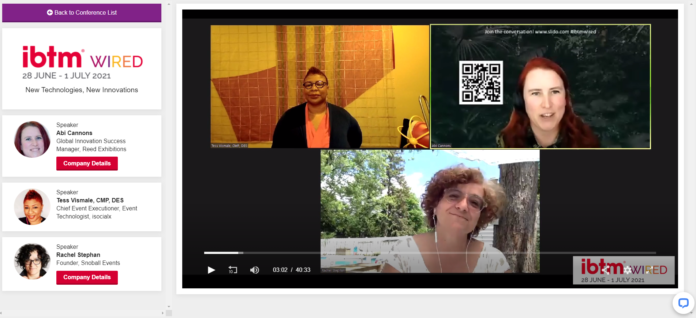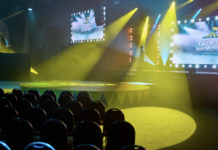Talking on day two of IBTM Wired, Abi Cannons, Global Innovation Success Manager, Reed Exhibitions, Tess Vismale, CMP, DES, Chief Event Executioner, Event Technologist, isocialx and Rachel Stephan, Founder, Snoball Events discussed new technology and new innovations in events.
Reflecting on the past 18 months, Vismale and Stephan talked about the fear and uncertainty that the industry experienced initially. There was a lot of confusion, and a lot of challenges from a resource and skills point of view. “Digital was an immediate band-aid solution so that people could continue on,” said Stephan.
The most important thing when considering what technology to use is to first decide on your goal, and then you can decide which technology best fits that goal, rather than the other way around. Both speakers emphasised that learning about event technology is crucial now because this is the time when we get to design and define what this means for our industry. “I’m a firm believer that everyone needs a technologist on their team now,” said Vismale.
In terms of gaining event technology skills, it’s not one size fits all. There are many learning resources but defining your goals must come first. The concept of consolidating ideas between different areas of businesses to share learnings was raised, as well as sharing learnings across businesses in order to learn from each other. “Imagine if individual meeting planners could get together and talk about their mistakes and learnings,” said Stephan. “It would be interesting to collaborate in this way.”
Discussing the hot topic of hybrid events, Linda McNairy, VP Americas, American Express Meetings & Events and Ariana Reed, Senior Manager, Business Strategy, American Express Global Business Travel highlighted key considerations in the planning process to create an engaging hybrid event experience.
Ariana noted that the last year has brought many different lessons, including trying to find ways of engaging in a meaningful way without being face to face. We’re at an exciting time with another learning curve with hybrid events, as we ensure that virtual and in-person attendees each have a positive and immersive experience.
It’s an interesting time, with different people having different comfort levels when it comes to getting back to in-person events. Also, our lives at home have changed – prior to covid it wasn’t always easy to say no to attending an event in-person. Now, events and organisations are much more accommodating of life around work. Attendee wellbeing is key, and it should be a choice to attend, so organisers now have to think about what the drive for delegates is to attend in-person and, sometimes even virtually.
There are several considerations when planning a hybrid event as you have two audiences, multiple personas and just one event. Organisers need to: get in your attendees’ heads; define the event format; evaluate technology needs alongside the venue; provide assurances for in-person attendees; supercharge meeting design; incorporate self-care and mindfulness; be meticulous with your attendee communications and, importantly, budget for more as you have your traditional costs plus the hybrid technology and production costs on top.
It’s almost impossible to deliver the same experience for virtual and live but there are so many options to create an equally engaging experience through virtual networking and on-demand content, for example. Ultimately, to make a truly hybrid event, two events – in-person and virtual – must be planned in integrated in parallel.
In the second instalment of the IBTM Wired industry trends report, Alistair Turner, Managing Director, EIGHT PR & Marketing was in conversation with Sherrif Karamat, President & CEO, PCMA to discuss industry trends in the Americas.
The last six months has been a period of transition where optimism has been growing on an almost daily basis. Since January 2021, over 50 per cent of the US population has been fully vaccinated, which is changing the dynamic for business events.
Travel has begun opening up in line with the vaccination programme in America, however, international borders are still not open. Consequently, many events have been delayed to the later part of this year, and PCMA’s Business Events Compass report predicts that pre-Covid levels may not be achieved until 2023.
Omnichannel events are here to stay, which is about meeting customers where they are, not where you want to be. He adds that digital engagement fosters face to face engagement. “In the 80s and 90s there used to be television blackouts during major sporting events to try to get people to go to the live games,” says Karamat. “Then they realised that if they opened up the games and showed them on TV, it would make people want to go even more.”
Just 18 months ago, we were not even close to using technology in the way we are using it today. However, the majority of current digital engagement has been made with a face-to-face lens. Karamat says that over the next few years we will see innovators and technology companies developing platforms specifically designed for digital experiences.
“Covid was also a wake-up call for us when it comes to climate change. I think pandemic 2.0 will be about climate change.” Karamat emphasised that this is not about flight shaming, but about developing transformative solutions to climate change, which speaks to the type of fuels we use, and the type of materials we use. Ultimately, this creates a much more sustainable economy and a more exciting future for the younger generation. “I look at climate change not as a problem but as something we have to solve that will create employment and opportunities for youth for many decades to come,” says Karamat.












